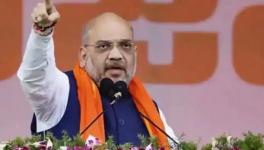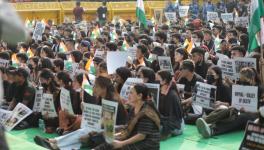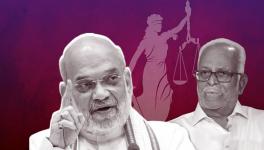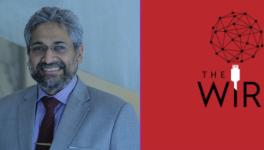BJP Does to J&K Media What Indira Gandhi did in Emergency
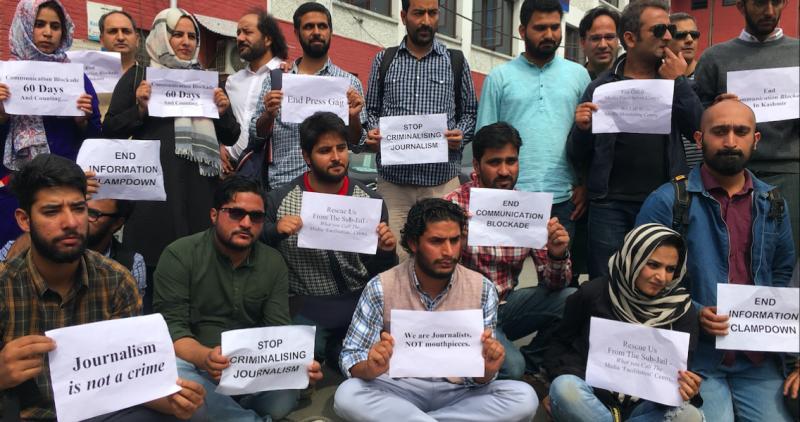
Representational image. | Image Courtesy: The Wire
On 25 June 2019, Home Minister Amit Shah, with the flamboyance so typical of him, tweeted, “On this day in 1975, the country’s democracy was killed for political interests. Basic rights were stripped from the countrymen, newspapers were locked up.” During the Emergency, which Prime Minister Indira Gandhi imposed before midnight on 25 June 1975, newspapers were not really locked up. They were, instead, compelled to turn into her government’s voice, their right to criticise her or express their views summarily crushed.
As Bharatiya Janata Party leaders recall the dark days of Emergency, as they always do on this day every year, journalists in Jammu and Kashmir fear media outlets will close down, one after another, unless they choose to become the Union government’s voice. Or they will face prosecution for engaging in “anti-national activities” unless they subscribe to the government’s idea of news.
These fears have gripped journalists because of the New Media Policy that the J&K government announced through an order of 15 May. “The Media Policy 2020 paves the road for killing journalism in one go,” said Anuradha Bhasin, the feisty executive editor of the Kashmir Times, which has been in the cross-hairs of the establishment for long. “Virtually, the media policy makes the government the judge, jury and arbiter on every spoken and written word by an individual or an organisation,” she said.
The Media Policy 2020 begins with a justification. It claims that a fresh set of guidelines for the media are needed to “carry the message of welfare, development and progress to the people in an effective manner.” Given that people can experience development in their daily lives, why would the government need the media to tell its readers that they are progressing—and that J&K is turning into a paradise?
One justification for the Union government’s reading down of Article 370, on 5 August 2019, was that this measure would usher in development in J&K. The media policy notes that “projects languishing for many years have been taken up and completed.” But the people have seemingly failed to notice these laudatory achievements because, “unfortunately, the media has tended to focus on the security aspects of the UT [Union Territory].”
It is, therefore, imperative that the media turn away their focus from “security”, a reference to the armed secessionist movement in the Valley. The first step in turning the media into government’s voice anywhere in the world is to deny journalists the right to determine what is news. This denial has purportedly a noble intent: J&K “has been fighting a proxy war supported and abetted from across the border. In such a situation, it is extremely important that the efforts of anti-social and anti-national elements to disturb the peace are thwarted”.
It does seem that the J&K government believes some journalists are likely to be “anti-national elements” or are in league with them. One cannot but draw this conclusion from the policy document, which says, “In order to ensure the above (thwart anti-social and anti-national elements), it shall be made incumbent that before Empanelment of newspapers/news portals for release of advertisements by the government, the antecedents of the paper/news portal as well that of publishers/editors/key personnel are duly gone into.”
It seems that, in one stroke, bureaucrats in the J&K government’s information department can sully a media outlet’s reputation. Perhaps this is plain paranoia, for bureaucrats are said to be rational people. Nevertheless, it does speak of the climate of fear in J&K that several editors I spoke to identified this clause in the document as an instrument devised to compel them to toe the government’s line.
Some of these editors spoke on condition of anonymity. One of them said, “I am getting on with age. I would not want to be summoned to a police station and made to sit there for an entire day.” A couple of others said they are responsible for their staff and do not wish to be denied government advertisements for speaking to me on the record.
Significantly, the government will constantly keep an eye on media outlets’ content to identify “fake news, plagiarism and unethical or anti-national activities.”
It is a bit bewildering why the government should bother about plagiarism, which is an issue between the writer and the one from whom he or she copies. Could it be that the weapon of plagiarism could also be deployed against a journalist who, for instance, scoops and prints an unpublished government document? Or has the clause on plagiarism been inserted because of the government’s desire to play editor-in-chief or media ombudsman?
Nevertheless, once found guilty on any of the three counts—fake news, plagiarism, unethical or anti-national activities—a media outlet “shall be de-empanelled [and therefore denied advertisements] besides being proceeded against under law”. Thus, denied revenue, the de-empanelled entity will also have to incur expenditure on court proceedings.
Fahad Shah, who edits The Kashmir Walla, a weekend newspaper, said to me, “Fake news and anti-national are terms that are ambiguous.” Shah should know the ambiguous nature of these terms, as he was, on 20 May, summoned to the Cyber Police Station in Srinagar, where he was made to sit for two hours before he was told about his alleged infraction. The Kashmir Walla had featured a video on the aftermath of the gunfight in Nawakadal, also in Srinagar, in which residents claimed 15 houses had been burnt, and alleged that the government forces had indulged in looting. Officials who questioned Shah accused him of “maligning the police’s reputation.”
In a statement that The Kashmir Walla released then, Shah said, “If the police differed with the allegations of the local residents, we would have given equal space to the same in our report as a professional journalist. However, no such clarification was given.” Under the new media policy, Shah could very well be proceeded against for anti-national activities, although his website, an independent publication, does not receive any government advertisements.
Or take Masrat Zahra, a freelance photographer who was booked under the draconian Unlawful Activities Prevention Act (UAPA) in April. Her fault was that she had uploaded photographs she had taken for a story in 2019 on her Facebook page. In a statement explaining its decision to book her, the police said, “The user is also uploading posts that tantamount to glorify anti-national activities and dent image of law enforcing agencies besides causing disaffection against the country.”
Will Zahra, under the new media policy, get accreditation? It is quite unlikely.
Citing the example of Zahra, an editor said, “Democracy is supposed to run on the four wheels of executive, judiciary, legislature and media. The new policy intends to run democracy on just one wheel, of the executive.” This editor and others complain that articles they publish are not too different from what Delhi-based newspapers feature, but it is they who are tarred as anti-national.
This editor has a point. For instance, nobody in Kashmir will dare to write the piece—Think the Unthinkable—that journalist and former editor Vir Sanghvi wrote in The Hindustan Times in 2008, after the erstwhile State erupted following the transfer of 99 acres of land to the Sri Amarnathji Shrine Board. Sanghvi commented in the piece, “I reckon we should hold a referendum in the Valley. Let the Kashmiris determine their own destiny. If they want to stay in India, they are welcome. But if they don’t, then we have no moral right to force them to remain.”
It is hard to think of any newspaper in J&K that will publish a piece such as Sanghvi’s, at least not under the new media policy. The different yardstick employed to judge the media in J&K is why Bashir Manzar, the editor of Kashmir Images, said to me: “There should not be a media monitoring cell, but if there has to be one, it should have media experts, even if they are from outside Kashmir. They will at least know how the media functions.”
Many journalists say there may have been a time when the right to self-determination was articulated in the newspapers published from J&K. But the arguments cited in such articles mostly relied on historical facts, such as Jawaharlal Nehru’s promises in this regard and the United Nations resolutions.
Arif Shafi Wani, who is the executive editor of Greater Kashmir, the UT’s largest circulating daily, said, “No one writes such articles any longer. Since 5 August, even the separatists do not issue statements asserting the right to secede. Only mainstream politicians issue press releases, which ask for restoration of Art 370.” Wani thinks the new media policy is, therefore, a “psychological tactics” geared to “caution” journalists.
Hafiz Ayaz Gani, who is the editor-in-chief of Rising Kashmir, said, “A media policy is always welcome but it should try to address the problems faced by journalists rather than create new ones.” He was of the opinion that established media organisations should have been consulted before the media policy had been framed and their grievances taken into account. “Our biggest concern would definitely have been the financial constraints that the media face in these times of economic downturn,” Gani said.
In fact, the new media policy appears to exploit the gloomy economic scenario to tame journalists. This is evident from the threat of de-empanelment and denial of government advertisements mentioned in the policy document. Indeed, governments, whether at the Centre or in states, are habituated to using the carrot of advertisements to tame the media. The carrot turns into a deadly stick when advertisements are withheld.
This practice is neither unique to J&K nor has it come into vogue because of the governor’s rule there. For instance, Bhasin’s Kashmir Times has been denied the Central government’s advertisements since 2010, when the Congress-led United Progressive Alliance was in power.
In the same year, the Central government advertisements were also denied to the Greater Kashmir and its Urdu publication, Kashmir Uzma, and Rising Kashmir. Such advertisements were issued to them, at least intermittently, from 2012 until 2015. No central government advertisements have come to any of the four biggies since 2016. The rates of central government ads are far better than those issued by the state government.
State government advertisements constituted just over 14% of the total revenue that the Greater Kashmir’s two English editions, in Jammu and Srinagar, and the Uzma, generated over the last three financial years. Before the central government decided to stop giving advertisements, revenue from these plus those from the state government would constitute 30% of the media company’s total revenue, which was also much higher than what it is today.
This is likely to get even worse as advertisements of autonomous bodies, such as banks, will now have to be routed through the state’s information department. Earlier, the J&K Bank, for instance, would place advertisements in newspapers of its own accord. This means the state government will now have a greater control over how much revenue a newspaper can generate.
The threat of being de-empanelled and denied even state government advertisements will acquire a sharper edge as the Indian economy shrinks. As Bhasin explained, “The private sector hardly has a presence in J&K. The economic downturn means companies selling white goods in J&K are less likely to spend on advertisements. The media have been hit by demonetisation, Goods and Services Tax, and the economic freeze caused by the lockdown.”
Greater Kashmir’s Wani said they have approached the Press Council of India with the plea that central government advertisements should be released to newspapers in J&K.
There are many who will say that whoever pays the piper always calls the tune. Or, to put it in another way, newspapers must play ball to get government advertisements. But then, as some argue, the money that the government spends belongs to the people. A counter to it is that in a democracy all government’s decisions are deemed to express the will of the people. There is nothing wrong in the government deciding which newspaper it wants to support.
Yet decisions violating the fundamental right of free speech are legally questionable and inimical to democracy. In Sakal Papers (P) Ltd versus Union of India, for instance, the Supreme Court held that the state could not make laws which directly affected the circulation of a newspaper. Let alone affecting the circulation, the J&K government’s new media policy threatens to lock out the media and, therefore, effectively locking it up, which is precisely what Home Minister Shah claimed was the outcome of Indira Gandhi’s Emergency 45 years ago.
The author is an independent journalist. The views are personal.
Get the latest reports & analysis with people's perspective on Protests, movements & deep analytical videos, discussions of the current affairs in your Telegram app. Subscribe to NewsClick's Telegram channel & get Real-Time updates on stories, as they get published on our website.














